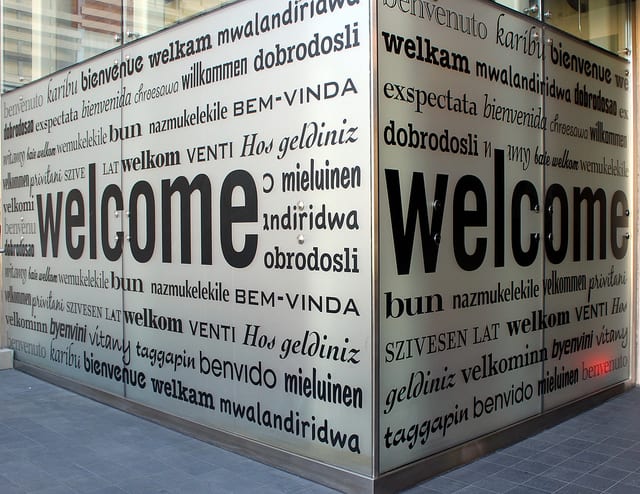
Recognizing Gifts of Hospitality
Chapter 53 of Benedict’s Rule sets a challenging standard for monastic hospitality. Monks are to receive and welcome their guests as Christ, recognizing the spiritual life within them.
We seem to assume hospitality is about making ourselves look good. When we invite people to stay with us we hope they feel impressively welcomed. We often hope our homes will seem even more well organized than they usually are. Most of us try to give our visitors nice, relaxing stays by anticipating and avoiding any unpleasantries.
Monasteries were known for hospitality long before there was a hospitality industry. In remote locations monasteries were some of the few safe places for pilgrims to stay. Pilgrims and other guests are still welcome. Monasteries, though, are not hotels.
Monastic hospitality is not concerned with providing ostentatious service. Guests are welcome to participate in the monastic community. Monastic hospitality is more about sharing our true selves than about trying to be impressive.
The monastic gifts of hospitality we receive provide a place for us to be ourselves. We are invited to experience the community for ourselves.
Monastic hospitality is about a community of sharing our true selves.
Our time in a monastery can be an excellent opportunity to let go of whatever we are holding onto tightly. We may be holding ourselves up, or holding ourselves back. There may be habits which were helpful in the past, but which have outlived their usefulness. We may have expectations we absorbed from others but which are not our own.
Monasteries can be places for us to drop our masks and recognize our own true selves. As each of us is welcomed in the community we are invited to take our next steps in honesty.
We find ourselves receiving some of the gifts of hospitality.
Giving Gifts of Hospitality
Hospitality has been significant to our stories since they began. We are the most recent in a long line of wanderers, people looking for a new home.
Our stories tell us we are refugees, strangers, and immigrants. No matter which countries and spiritual traditions we claim, they are stronger because of people who came from somewhere else.
Our stories are flavored with spices from around the world.
Hospitality is more, and more significant, than being friendly. It is how we share ourselves with other people. We need to know ourselves intimately before we are able to share ourselves with others.
When we can see ourselves more clearly, we are better able to find ourselves in others. Hospitality is a demonstration of our empathy, our connection, what we share with others. It is a recognition we owe what we have to the generosity of people we have never met. As we live because of hospitality generations ago, our hospitality has implications for generations to come.
Our impression of hospitality is it is about being nice and kind, a little soft. In fact, our decisions about when and how we practice hospitality are eminently real.
The gifts of hospitality we give and receive are not necessarily intended to make our lives easier. We experience gifts of hospitality when people share themselves with us. They trust us with their most precious belongings and show us who they are. We share gifts of hospitality when we trust other people enough to share ourselves.
It is a gift when someone is honest and transparent with us and when we can be honest with them. Hospitality is not about the comfort of the finest sheets with the highest thread counts. It is about sharing the reality of our lives.
Putting Gifts of Hospitality to Use
We are pilgrims who leave home and walk toward spiritual life.
At the mercy of other people, we depend on them to take us in at night and take us along on our journey. Our pilgrimage takes us as far as we can go each day and, far from home, we stop to rest each evening. We take only what we can carry, hoping we are prepared for the challenges we will face. Each day, each step, can be unpredictable. We need a place to rest, to remember, and to recharge our phones each night. Slowly, over time, the rhythm of days and nights allows us to become better pilgrims.
I would not get anywhere if there were not someone to encourage me and teach me lessons along the way. I would never begin if there were nowhere for me to rest along the way. The walking and the resting are two halves of my pilgrimage. Walking and resting, actions and contemplation, each plays its vital part.
The people who teach me what I need to know and the people who give me a place to rest each show me true hospitality. The gifts they give come from who they are. They share their true selves with me and I know my own true self more deeply.
Appreciating Gifts of Hospitality
When I visit New Camaldoli Hermitage there is no welcoming committee. They give me the gifts of hospitality which come from allowing me to gently join their daily rhythms.
In fact, even though I have live hours away, I have never left the community. My practices as a lay Oblate keep me connected to the community no matter where I am. They have welcomed me and received me.
I have received their gifts of hospitality which shape the gifts of hospitality I give to others.
The gifts of hospitality I receive often come when I am the one offering hospitality. Together we share hospitality with each other and together we receive the gifts of hospitality. We share the gifts of hospitality with each other.
Our contemplative practices reveal our own true selves to us. We grow acquainted with ourselves and offer gifts of hospitality to the people around us.
Thank you for the gifts of hospitality you offer.
How will we offer and receive gifts of hospitality today?
When will we recognize and appreciate gifts of hospitality this week?
[Image by Prayitno]
Greg Richardson is a spiritual life mentor and coach in Southern California. He is a recovering attorney and a lay Oblate with New Camaldoli Hermitage near Big Sur, California. Greg’s website is StrategicMonk.com, and his email address is [email protected].












